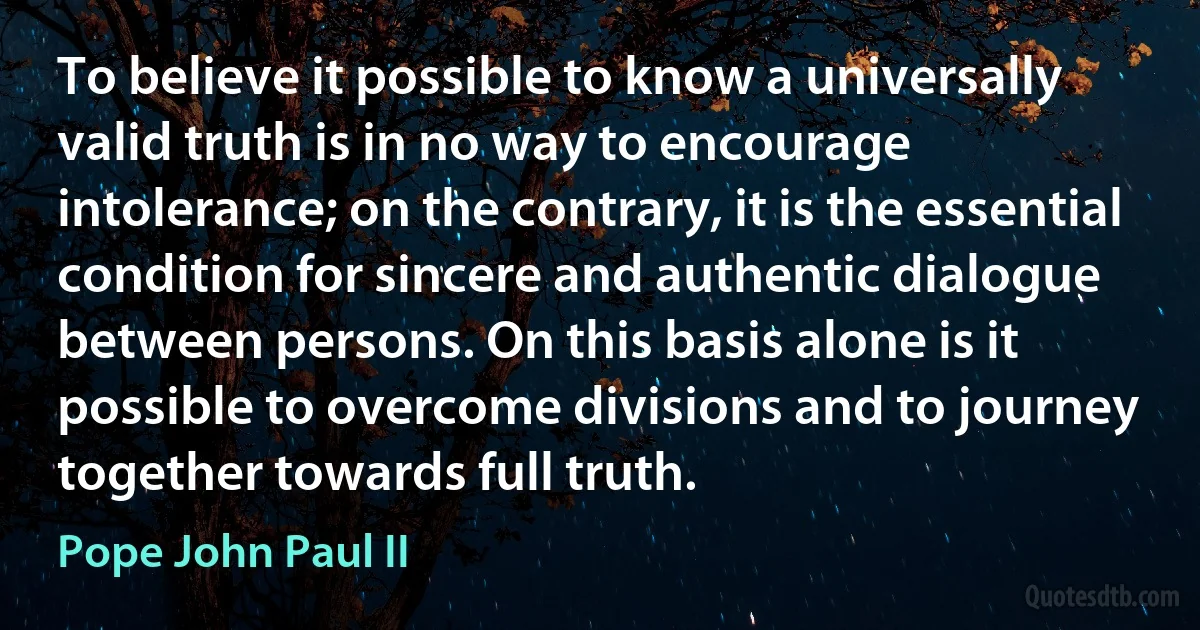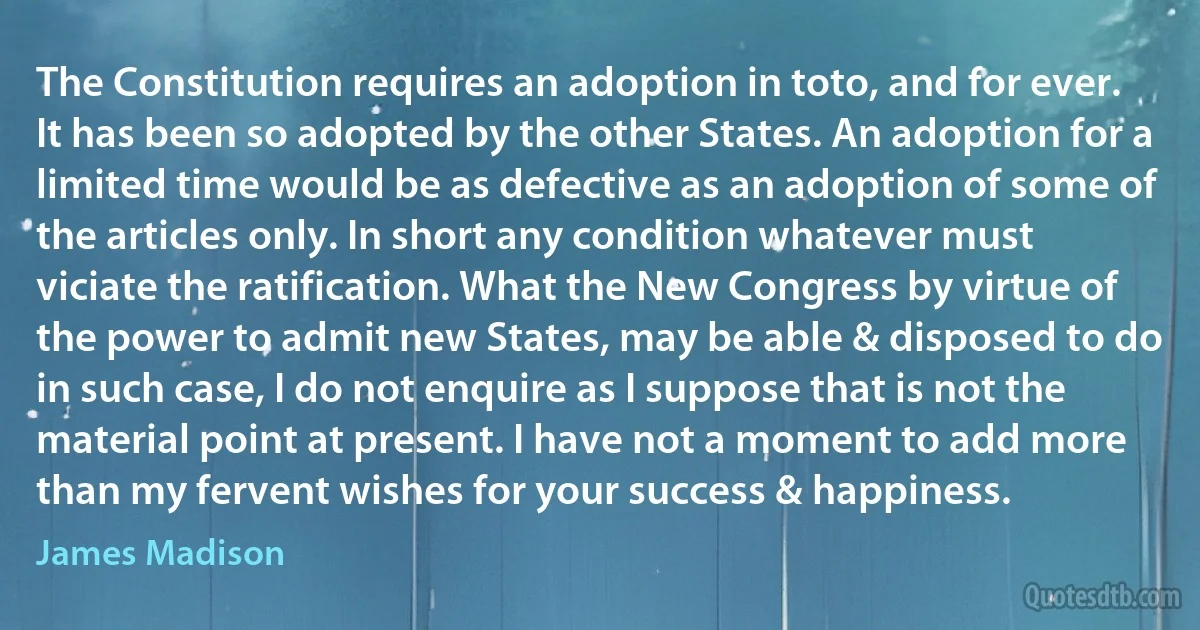Condition Quotes - page 66
The Church is called upon to manifest anew to everyone, with clear and stronger conviction, her will to promote human life by every means and to defend it against all attacks, in whatever condition or state of development it is found. Thus the Church condemns as a grave offense against human dignity and justice all those activities of governments or other public authorities which attempt to limit in any way the freedom of couples in deciding about children. Consequently, any violence applied by such authorities in favor of contraception or, still worse, of sterilization and procured abortion, must be altogether condemned and forcefully rejected. Likewise to be denounced as gravely unjust are cases where, in international relations, economic help given for the advancement of peoples is made conditional on programs of contraception, sterilization and procured abortion.

Pope John Paul II
Unfortunately, we do not realize that when we do our work in a hurry, we become nervous. And when work is done nervously, it is not sanctified. Our goal should not be to do many things and be in constant anxiety. This is a demonic condition. What is done with calmness and prayer is blessed, and it also blesses the people who use it.

Paisios of Mount Athos
Much as many conservatives believe anyone would be better than President Obama, the Republican that the party nominated to compete against him in 2008 really wouldn't have been all that different. We still would have had scandals. The economy still would have floundered. The big differences: A war-weary American public would have been dragged into more wars, an auto industry in critical condition would have been left to die, ObamaCare would never have existed, and a grassroots conservative movement would have lacked the liberal foil needed to grow and thrive.

John McCain
Cancer will not defeat John McCain. And John McCain will not beat cancer. Cancer is neither an opponent nor a binary condition. A medical team finds it, cuts it out, poisons it, irradiates it and prays for the best. If they are successful, if your stars are aligned, your cancer will go into hiding and lurk just outside the gates of good fortune for a long time.

John McCain
To be in good moral condition requires at least as much training as to be in good physical condition. But that certainly does not mean asceticism or self-mortification. Nor do I appreciate in the least the idealization of the "simple peasant life." I have almost a horror of it, and instead of submitting to it myself I want to drag out even the peasantry from it, not to urbanization, but to the spread of urban cultural facilities to rural areas.

Jawaharlal Nehru
To preserve the freedom of the human mind then and freedom of the press, every spirit should be ready to devote itself to martyrdom; for as long as we may think as we will, and speak as we think, the condition of man will proceed in improvement. The generation which is going off the stage has deserved well of mankind for the struggles it has made, and for having arrested the course of despotism which had overwhelmed the world for thousands and thousands of years. If there seems to be danger that the ground they have gained will be lost again, that danger comes from the generation your contemporary. But that the enthusiasm which characterizes youth should lift its parricide hands against freedom and science would be such a monstrous phenomenon as I cannot place among possible things in this age and country.

Thomas Jefferson
One may be astonished and even scandalized at the frequency, in religious climates, of more or less unintelligent opinions and attitudes, let it be said without euphemism; the indirect cause of this phenomenon is that religion, the goal of which is to save the largest possible number of souls and not to satisfy the need for causal explanations of an intellectual elite, has no motive for directly addressing the intelligence as such. In keeping with its end and with the capacity of the majority, the religious message is basically addressed to intuition, sentiment, and imagination, and then to the will, and to reason to the extent that the human condition requires it; it informs men of the reality of God, of the immortality of the soul and of their ensuing consequences for man, and it offers man the means of saving himself. It is not, does not wish to be, and cannot be, or offer, anything else, at least not explicitly; for implicitly it offers everything.

Frithjof Schuon
Has the reason shared the condition of the other faculties, which our fall has so grievously injured? Is the reason corrupted? Mediately, yes; immediately, no: at least that is my belief. Our reason is the reporter of our sensations: if our sensations make a false deposition, our reason will make a false judgment. And this is what happens through the obscuration of our moral sense and the tumult of our passions; the judge is uncorrupted, but he is misinformed.

Alexandre Vinet
We must not inadvertently slip into the same condition internally as the one which we fight externally. Like Abraham Lincoln, I am a firm believer in the people and, if given the truth, they can be depended on to meet any national crisis. The point is to bring before them the real facts.

Douglas MacArthur
The U.S. Navy hated MacArthur, really hated him. Early in the Pacific War it began agitating for an overall command in the area, the idea being to get MacArthur and his troops under its control. Believing Marshall to share their antipathy, the Navy enlisted his support and was delighted when he appeared to give it. "But on one condition," he said. "If we're going to have an overall commander in the Pacific, there isn't any question about it, you will have to pick MacArthur- on the basis of pure competence alone." The Navy abruptly abandoned the idea. Later, when the Navy wished to bypass the liberation of the Philippines in favor of operations against Formosa, it was Marshall who again intervened to insist MacArthur be allowed to fulfill his pledge to the Philippine people, to whom he had vowed, "I shall return." He was given the go-ahead to do so, and, of course, was hailed as the greatest hero of the Pacific war.

Douglas MacArthur
Men and boys are learning all kinds of trades but how to make men of themselves. They learn to make houses; but they are not so well housed, they are not so contented in their houses, as the woodchucks in their holes. What is the use of a house if you haven't got a tolerable planet to put it on? - If you cannot tolerate the planet that it is on? Grade the ground first. If a man believes and expects great things of himself, it makes no odds where you put him, or what you show him ... he will be surrounded by grandeur. He is in the condition of a healthy and hungry man, who says to himself, - How sweet this crust is!

Henry David Thoreau
Four days after this was given to the world he took to his bed, and he remained there for nine weeks. Such a blow following hard on the heels of such a triumph aroused the liveliest sympathy. The doors of the Royal Institution were beset by anxious inquirers, and written reports of his condition at various periods of the day had to be posted in the hall.

Humphry Davy
A permanent state of transition is man's most noble condition. When we say an artist is in a state of transition, many believe that we are belittling. In my opinion when people speak of an art of transition this indicates a better art and the best that art can give. Transition is a complete present which unites the past and the future in a momentary progressive ecstasy, a progressive eternity, a true eternity of eternities, eternal moments. Progressive ecstasy is above all dynamic; movement is what sustains life and true death is nothing but lack of movement, be the corpse upright or supine. Without movement life is annihilated, within and without, for lack of dynamic cohesion. But the dynamism should be principally of the spirit, of the idea, it should be a moral dynamic ecstasy, dynamic in relation to progress, ecstatic in relation to permanence.

Juan Ramón Jiménez
Altruism is an instinct we've inherited from the small society where we knew for whom we work, whom we serve. When you pass from this, as I like to call it, 'concrete society', where we are guided by what we see, to the abstract society which far transcends our range of vision, it becomes necessary that we are guided not by the knowledge of the effect of what we do, but by some abstract symbols. Now, the only symbol which tells us where we can make the best contribution is profit. And in fact by pursuing profit, we are as altruistic as we can possibly be, because we extend our concern to people who are beyond our range of personal conception. This is a condition which makes it possible to produce what I call an extended order, an order which is not determined by our aim, by our knowing what are the most urgent needs, but by an impersonal mechanism which by a system of communication puts a label on certain things which is fully impersonal.

Friedrich Hayek
As a condition of equal treatment, we homosexuals are expected to conform to the straight system, adopting its norms and aspirations. The end result is gay co-option and invisibilisation. We get equality, but the price we pay is the surrender of our unique, distinctive queer identity, lifestyle and values (the important insights and ethics that we have forged in response to exclusion and discrimination by a hostile straight world). [...] Meanwhile, all the sex-repressive social structures, institutions and moralities remain intact, and the "bad gays" remain sexual outlaws.

Peter Tatchell
My right hon. Friend says she [Germany] is in such a condition that she cannot possibly pay [reparations]. No, she cannot pay us. She is to pay France in full. Everything goes to France, everything goes to Italy, everything goes to Belgium; but, forsooth, she has not the capacity to pay Great Britain. I object. We were equal in the sacrifices we had to make, and I think it is about time that someone should stand up for the rights of Great Britain.

David Lloyd George
If we had been as ready in 1924 with definite concrete proposals as we are today, we could have gone to the Labour Party and said: "Here are our proposals with regard to the land, electricity, and the mines, and the condition of our support is that you should deal with them." We should have now been in the third year of carrying out a great programme of social reform instead of being in the horrible muddle we are in at the present moment. Are we going to get another chance? I think we are.

David Lloyd George
A paralysis of will seemed to have seized the Government. Whatever the subject, it was impossible to get a move on. I am not sure that this palsy did not account for the unanimity of the Cabinet on the question of rejecting overtures for Peace. These would have meant action. The pacifist element were easily persuaded to do nothing. The Government was getting into that nervous condition where they could neither wage war nor negotiate peace.

David Lloyd George
To desire is to obtain; to aspire is to, achieve. Shall man's basest desires receive the fullest measure of gratification, and his purest aspirations starve for lack of sustenance? Such is not the Law: such a condition of things can never obtain: "ask and receive."
Dream lofty dreams, and as you dream, so shall you become. Your Vision is the promise of what you shall one day be; your Ideal is the prophecy of what you shall at last unveil.

James Allen



